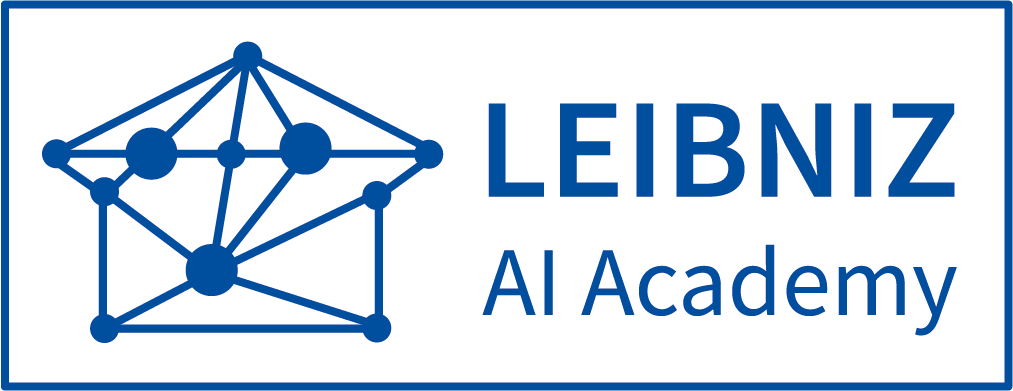Artificial Intelligence 1
![[Translate to English:] A picture of a cute robot representing the general idea of Artificial Intelligence](https://www.ai-academy.uni-hannover.de/fileadmin/_processed_/8/1/csm_Artificial-Intelligence_aeba24068e.jpg)
![[Translate to English:] A picture of a cute robot representing the general idea of Artificial Intelligence](https://www.ai-academy.uni-hannover.de/fileadmin/_processed_/8/1/csm_Artificial-Intelligence_4fe4fb8073.jpg)
![[Translate to English:] A picture of a cute robot representing the general idea of Artificial Intelligence](https://www.ai-academy.uni-hannover.de/fileadmin/_processed_/8/1/csm_Artificial-Intelligence_a65cab3634.jpg)
Responsible: Prof. Dr. Wolfgang Nejdl
Description (learning goals and competencies): Inspired by the CS188 course at Berkeley and in coordination with its instructors, we offer both events Artificial Intelligence 1+2. The courses are offered online as a live event and then made available as a recording. The exercises are offered as a flipped classroom with live Q&A question time and also include two mini-projects per semester. In terms of content, the module covers Search and Constraint Satisfaction, Markov Decision Processes, Hidden Markov Models and Reinforcement Learning, Probabilities and Bayes Nets, Machine Learning (Naive Bayes, Logistic Regression, Decision Trees, Neural Networks).
Credits: 5
Language: German
Machine Learning
![[Translate to English:] A picture of a graph](https://www.ai-academy.uni-hannover.de/fileadmin/_processed_/6/a/csm_ML-graph_00a25b507e.jpg)
![[Translate to English:] A picture of a graph](https://www.ai-academy.uni-hannover.de/fileadmin/_processed_/6/a/csm_ML-graph_c6bcb343c3.jpg)
![[Translate to English:] A picture of a graph](https://www.ai-academy.uni-hannover.de/fileadmin/_processed_/6/a/csm_ML-graph_e0ffd48051.jpg)
Responsible: Prof. Dr. Bodo Rosenhahn
Description: The course is devoted to classical and current machine learning paradigms. The goal is the "artificial" generation of knowledge from experience or examples: An artificial system analyses examples (data) in a structured way, learns from exactly these examples, and can generalise them after the learning phase is finished. In addition to unsupervised learning and statistical learning, Adaboost, Random Forests, and Neural Networks are also covered. Examples on image-based object recognition or classification provide current application references. The syllabus includes features, shape signature, shape context, unsupervised learning (clustering methods), minimal spanning trees, Markov clustering, Bayes classifier, appearance-based object recognition, hidden Markov models, PCA, Adaboost, random forests, neural networks,
Credits: 5
Language: German
Data Science Foundations
![[Translate to English:] Picture of analysis pie charts](https://www.ai-academy.uni-hannover.de/fileadmin/_processed_/c/2/csm_Data-Science_e68e01e1a2.jpg)
![[Translate to English:] Picture of analysis pie charts](https://www.ai-academy.uni-hannover.de/fileadmin/_processed_/c/2/csm_Data-Science_1449c7d6b6.jpg)
![[Translate to English:] Picture of analysis pie charts](https://www.ai-academy.uni-hannover.de/fileadmin/_processed_/c/2/csm_Data-Science_3909b4190f.jpg)
Responsible: Prof. Dr. Marius Lindauer
Description: Inspired by the "Data8" course offered at the Data Science Institute of California Berkeley University for all students and in close collaboration with their instructors, This course is aimed at students without any programming experience and covers fundamentals of algorithmic handling of data at an appropriate level for students from a wide range of majors. In doing so, the usual teaching is inverted. Students learn to deal with practical issues and use the centrally maintained Jupyter Notebook environment to focus on the programming tasks. The course covers core data science fundamentals: causality and correlation, big data, data extraction, data visualisation, random variables, sample comparison, hypothesis testing, estimation and prediction of test variables, classification, and ethical issues in data science. Parallel to the respective mathematical concepts, the course covers programming concepts such as data types, variables, assignments, control structures, and data processing functions. The course roughly follows the online book "Computational and Inferential Thinking".
Credits: 5
Language: English
Stochastics
![[Translate to English:] picture of analysis of stochastic data](https://www.ai-academy.uni-hannover.de/fileadmin/_processed_/3/c/csm_Stochastics_da3de90ebd.jpg)
![[Translate to English:] picture of analysis of stochastic data](https://www.ai-academy.uni-hannover.de/fileadmin/_processed_/3/c/csm_Stochastics_6e032f40ad.jpg)
![[Translate to English:] picture of analysis of stochastic data](https://www.ai-academy.uni-hannover.de/fileadmin/_processed_/3/c/csm_Stochastics_fb43dbdc63.jpg)
This course can only be watchted right now but an exam is not possible at the moment!
Responsible: Prof. Dr. Stefan Weber
Description: Students will learn the central basic concepts and methods of probability theory and statistics and will be able to use them appropriately to solve application problems and implement them algorithmically. Topics include probability spaces, random variables, distributions, limit theorems, the basics of stochastic processes, and the basic concepts of statistics, especially estimators, confidence intervals, tests, Bayesian statistics and linear models, and algorithms for simulation and statistical procedures.
Credits: 5
Language: English



